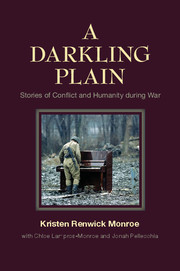Book contents
- Frontmatter
- Epigraph
- Contents
- Preface
- Introduction
- Part one War is a Terrible Thing!
- Part Two Guarding One’s Humanity During War: World War II
- Part Three Other Voices, Other Wars: From Indochina to Iraq
- Part Four Civil Wars and Genocides, Dictators and Domestic Oppressors
- 13 Grandfather Had his Head cut off
- 14 A Resistance to Keep You Alive
- 15 Stuck in the Mud in the Middle of a Civil War
- 16 Too Much was Seen
- 17 Care about other People
- 18 People Suffered Great Loss
- 19 Religion Mixed with Politics Creates Bad Things
- Part Five My Story, Your Choice How to Use it
- Conclusion
- Bibliography
- Acknowledgments by the Senior Author
- Index
19 - Religion Mixed with Politics Creates Bad Things
Leyla and the Islamic Republic of Iran
Published online by Cambridge University Press: 05 October 2014
- Frontmatter
- Epigraph
- Contents
- Preface
- Introduction
- Part one War is a Terrible Thing!
- Part Two Guarding One’s Humanity During War: World War II
- Part Three Other Voices, Other Wars: From Indochina to Iraq
- Part Four Civil Wars and Genocides, Dictators and Domestic Oppressors
- 13 Grandfather Had his Head cut off
- 14 A Resistance to Keep You Alive
- 15 Stuck in the Mud in the Middle of a Civil War
- 16 Too Much was Seen
- 17 Care about other People
- 18 People Suffered Great Loss
- 19 Religion Mixed with Politics Creates Bad Things
- Part Five My Story, Your Choice How to Use it
- Conclusion
- Bibliography
- Acknowledgments by the Senior Author
- Index
Summary
The 1979 Iranian Islamic Revolution overthrew the Iranian monarchy under the Shah Mohammad Reza Pahlavi, and replaced it with an officially Islamic Republic under Ayatollah Ruhollah Khomeini. Public demonstrations against the Shah and his repressive government began in October 1977. They intensified and erupted into widespread civil resistance – both secular and religious – with demonstrations and strikes that paralyzed oil-rich Iran from August until December 1978. The Shah left for exile mid-January 1979, and Ayatollah Khomeini returned within weeks, to a great welcome. Iran held a national referendum, voting to become an Islamic Republic and to approve a theocratic constitution making Khomeini Supreme Leader of the country in 1979. The Iranian revolution surprised the world, partly because it was precipitated without the usual triggers of revolution: defeat during war, a financial crisis, a disgruntled military, or a peasant uprising. The speed and the popularity of the rebellion further startled observers because it was the first time a modernizing monarchy was replaced by a theocratic state.
Things have not improved in Iran since Leyla left. The 1980–88 war with Iraq killed hundreds of thousands of people and cost Iran billions of dollars. The United States–imposed economic sanctions and emigration of 2–4 million skilled craftsmen, entrepreneurs, and educated professionals – such as Leyla – resulted in income levels below those of pre-revolutionary Iran. Mahmoud Ahmadinejad, the controversial president of the Islamic Republic of Iran from 2005 to 2013, was condemned for both his economic failures and his violations of human rights. His support for Iran's nuclear energy program and his anti-Semitic statements denying the Holocaust further isolated Iran and the current situation remains unclear under the present (2014) leadership in Iran.
- Type
- Chapter
- Information
- A Darkling PlainStories of Conflict and Humanity during War, pp. 249 - 258Publisher: Cambridge University PressPrint publication year: 2014



